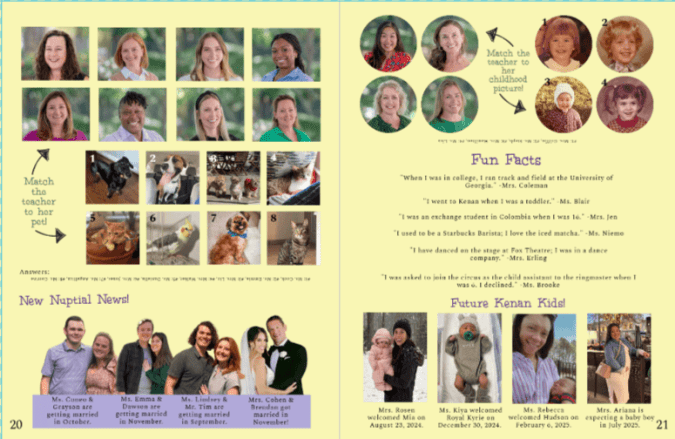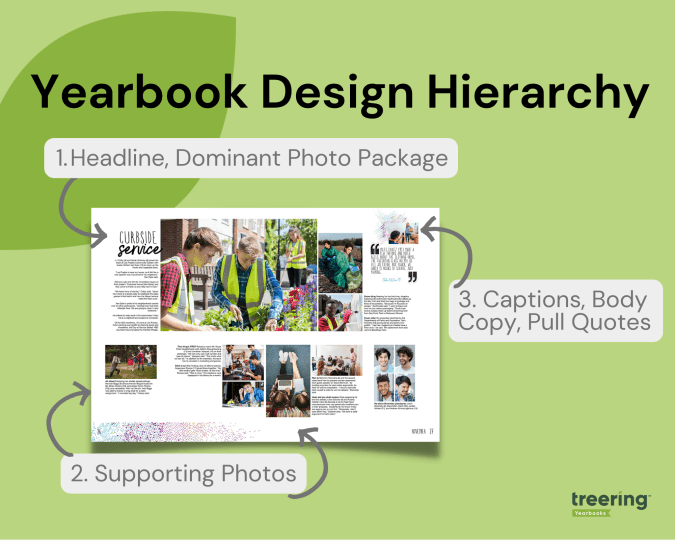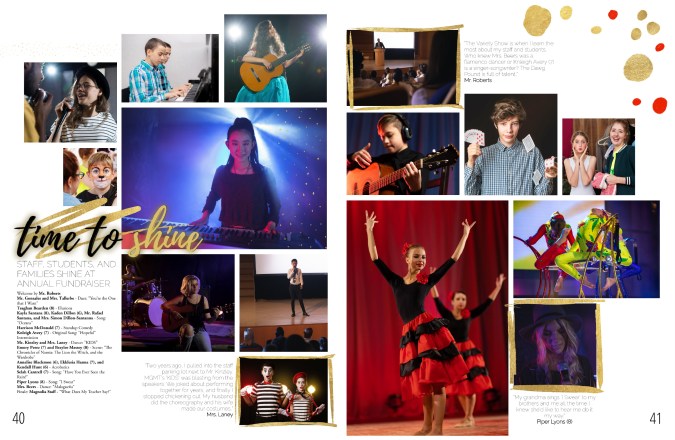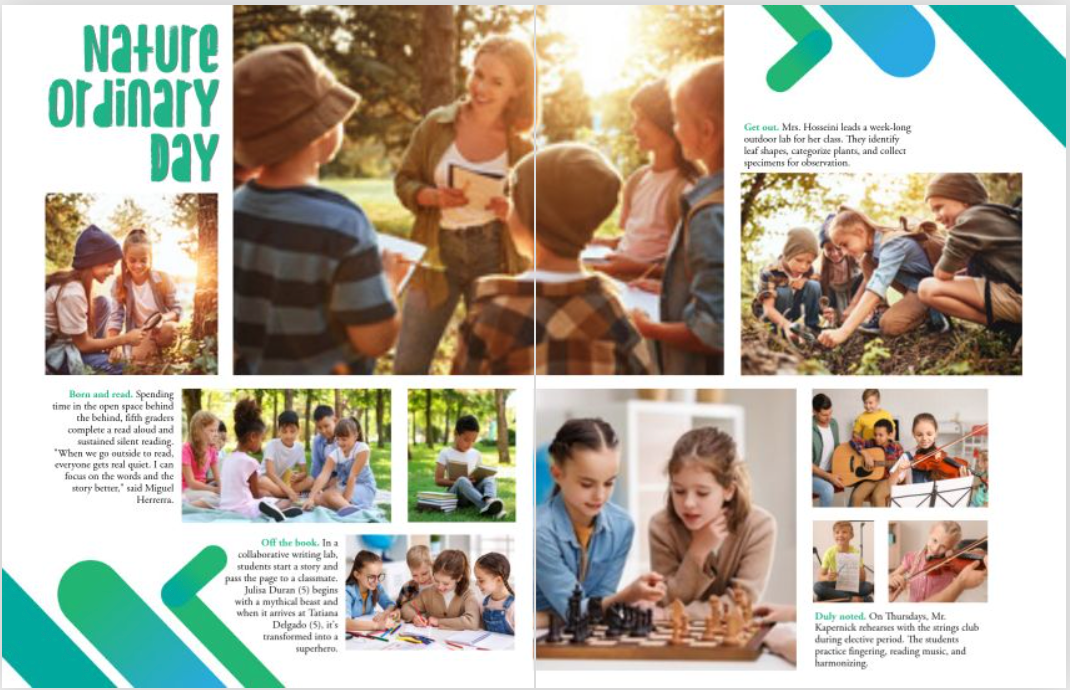Writing
Looking for inspiration, design tricks, how to make a great cover, promoting your yearbook and engaging your community?
Most recent

48 questions guaranteed to get teachers to open up during yearbook interviews
We think that teachers should always be treated like the rockstars they are. But that’s a double-edged sword. Because of their school “celebrity” status, we can sometimes get a little tongue-tied when it comes time to snag some quotes.
So if you’ve got a mod that needs some teacher insight, a spread offering a look ‘behind the curtain’ about teachers, or if you’re writing an article on a specific teacher and are looking for some pizzazz, you’ll need to ask some great questions. And we’ve got just the list.
Set up a time for the interview, take a moment to brush up on your interview skills, and then take the bull by the horns with these quote-baiting questions for teachers.

About life outside of school
- What is one of your hidden talents?
- What would the students be surprised to find out about you?
- What’s a typical Saturday night like for you?
- How often do you accidentally start speaking Spanish at home? Lecturing about fractions? Correcting grammar? [personalize to their subject].
- What are some pets you’ve had or would like to own?
- What is your dream vacation?
- How do you spend your summer breaks?
- What are your “trapped on a desert island” books or movies?
- What would your last meal be?
- What can you cook to perfection? Are you willing to share the recipe?
- If you won the lottery and decided to give up teaching, what would you do instead?
About school life
- What are some traditions or superstitions you have for the First Day of School?
- What makes a ‘good day’ at school?
- How do you show your school spirit?
- What accomplishment fills you with pride so far this year?
- What is your favorite dish from the cafeteria?
- What sort of morning routine do you have to get jazzed for class?
- How do you keep things fresh? [particularly good for seasoned teachers]
- What inspires you?
- How does technology make teaching more simple or difficult?
- Are there any embarrassing teaching moments you’re willing to share? What are they?
- What’s the best/worst thing about being a teacher?
- In which other teacher’s class would you like to enroll, even for a day? Why?
About the students
- What current trends are baffling to you? Why?
- So many students admire you. How do you make those connections? [*note: question should only be asked if the teacher is universally known for making great student connections]
- What differences do you see in your morning students versus the afternoon classes?
- If you could pass on any wisdom to your students, what would you share?
- How do you remember all of your students’ names?
- What’s a school sport or activity you enjoy watching?
- If you could take the students on a field trip to anywhere in the world, where would you take them?
- Why do (or don’t) you friend former students on Facebook?
Along the lines of a specific article or theme
- What kind of driver were you when you first got your license?
- If you were to be given a superlative when you were in school, what would it have been?
- Our yearbook’s theme this year is [....], how do you work to bring that to life in everyday classes?
- What song should students listen to when doing work for your class?
- What is your first memory from school?
- When or why is (or isn’t) a picture worth a thousand words?
- How do you think students will remember you and your class?
About nothing—Just for kicks (or mods)
- How long would you survive a zombie apocalypse? Why?
- In which Hogwarts house would you be sorted?
- If you could grow up in any decade, which would you choose?
- What are your thoughts on astrology? Do you know your sign?
- What are your must-have smartphone apps?
- Did you see the new Star Wars on opening night? What memories do you have from the first movie you ever saw in theatres?
- Is there a quote or saying that you live your life by?
- What would your perfect party look like?
- What is your spirit animal?
- What song do you know all the lyrics to?
And there you have it—48 yearbook questions that you can choose from to build an interview with a teacher. It’s important to remember that an interview is a conversation. Keep it natural, and use your time wisely. It’s better to get five quality responses instead of a dozen one-word answers. If you see a hook, run with it. Don’t be afraid to veer a bit off course when the opportunity presents itself. Wherever the conversation goes, these questions are a great start to an intriguing spread or mod, and can add some wonderful insight from your teachers to this year’s book.

Yearbook design hierarchy
Design hierarchy of a yearbook spread refers to the arrangement of elements on a page in order of importance, with the most important element drawing immediate attention and receiving support from secondary and tertiary elements. When you apply these design principles, you are taking your readers on a journey across each yearbook spread by telling them where to begin and where to exit each spread through visual cues. Sound complicated? No worries, we'll break it down below.

Dominant Elements
Think, "We're #1!" The dominant elements in yearbook hierarchy are headlines, the dominant photo package, and a subheadline. The dominant elements are just that: they dominate the most real estate on the spread. It's from them the rest of the content builds.
Headline
The headline is the most important element on a page and serves as a brief content summary. It should be attention-grabbing and provide an overview of the page's content.
Dominant Photo
This is self-explanatory: the largest photo on the spread is the dominant one. It draws the eye. It connects to the headline. It sets the tone for the entire spread. The best dominant photos are storytelling or action shots.
Subhead
The subhead is a secondary headline that provides more detail and context to the main headline. It can also be used to break up yearbook spreads into smaller sections, or modules.
Secondary Elements
Your secondary elements build from your dominant ones. Think of them as a great ensemble cast.
Photos
For most, photographs are the most important part of a yearbook. The individual images and their positioning on the spread can help further illustrate the page topic and make the page more visually appealing.
Quick tips:
- Eyes should look toward the center of the spread, not off the page
- Similar photos should be in proximity to one another
Tertiary Design Elements
If your headline and photographs did their job, readers will swoop in to enjoy your captions, copy, and extras.
Captions
These beauties provide context and information about the photos on a page, therefore they should be near their respective photograph. While they should be concise and well-written, it's easy to get cliche: "Tomás Bernal (7) enjoys his lunch." Start with the 5 Ws and then up your caption game by adding expanded captions.
Body Copy or Yearbook Stories
This is the main text on a page and provides the details and information about the subject being covered. It should be well-written, easy to read, and relevant to the headline and dominant topic of the spread. Often, when a dominant photo is of the storytelling variety, it will complement it and further explain its significance.
Sometimes, an "ident caption" will suffice. This is a list of names of students pictured, including their grade. In the middle school book below, the yearbook team used ident captions to outline the event program from the annual fundraiser.

Pull Quotes
Pull quotes are quotes from the body copy that are set off visually and used to highlight important or interesting information or one-off quotes from a student. They have both visual and verbal significance because they highlight the spread's topic with a unique POV. They can also add to the overall theme by bringing in theme elements.
Graphics and Design Elements
Like everything in yearbook design hierarchy, graphics and design elements, such as borders, backgrounds, and page numbers should be intentional. It's easy to get out of hand with Treering's graphics library, so that's why our design team cultivated 300-ish fully editable themes and color palettes for you. The purpose is to make the page more visually appealing and easier to navigate while telling the story of your year.


The hierarchy of a yearbook spread can vary depending on the page's content, and following this basic structure can help ensure that the page is well-organized and easy to read. If you're teaching yearbook or leading a club, use it
- As a checklist for students who are beginning to design
- For a scavenger hunt to see who can identify elements on a spread in a magazine or another school's yearbook
- To build your program by strengthening yearbook hierarchy in each design

Participate in National Scholastic Journalism Week 2022
Celebrating the students on campus—all of them—is what we love most about inclusive yearbooks. This year, the theme for Scholastic Journalism Week is “Amplifying Voices.” If you’re participating, or here for inspiration, here are some ways to integrate Scholastic Journalism Week into your school and get more students heard.
Monday: participate in #makingconnections
From PTA/PTO councils to journalism teachers, there are people willing to share best practices. It’s one of the reasons we love to share about Yearbook Heroes. Identify:
- Who is doing what I want to do?
- What can I learn from them?
- Who can inspire my students?
- What similar stories do we have on campus?
- Who is disconnected? How do we amplify their voice?
You may be the one to teach others—share your story!
Tuesday: #teachmeTuesday
Because this is a celebration of scholastic journalism, take some time to teach journalism. Start with a writing lesson or practice interviewing. Collectively, you could tackle intorduce media literacy or a difficult reporting assignment such as covering the recent wildfires or tornadoes.
Wednesday: be about the business of #sharingstories
Take advantage of our pre-planned social media calendar to jumpstart your shares. Make sure your posts feature diverse grades, activities, and subjects. This way, you show students the value individuals make to the whole of your school community.
In your yearbook, you may want to include quote packages or fill-ins to amplify voices and give students the means to share their stories.
Thursday: always fit in a #throwback
Throwback Thursdays are fun because you can do nearly anything:
- Feature stories from alumni (don’t forget to use their yearbook photo!)
- Collaborate with a social science teacher on campus to integrate journalism's impact on history
- Print and display favorite yearbook spreads or covers from the previous years
Friday: #democracyinaction
JEA encourages schools to use the last day of Scholastic Journalism Week to share how their schools and communities value the freedom of the press. Here are some ideas on how to participate:
Elementary schools
- Memorize the First Amendment
- Start student-led media projects
Middle and high schools
- Have a conversation with school administration over the Principal’s Guide for Scholastic Journalism
- Learn to evaluate sources
- Memorize the First Amendment
Your participation in Scholastic Journalism Week 2022, be it one day or all five, will show your journalism students their voices matter as well as the responsibility they have as campus advocates to be the voice of others.